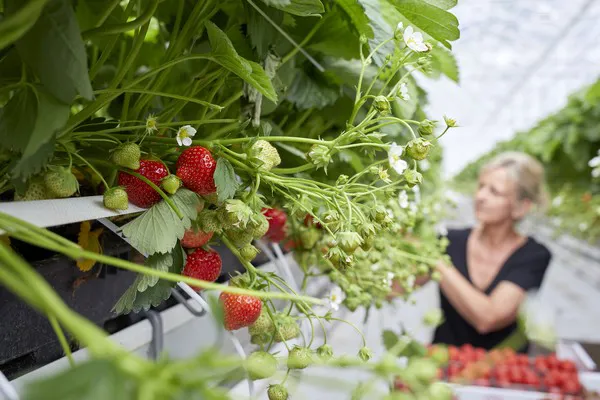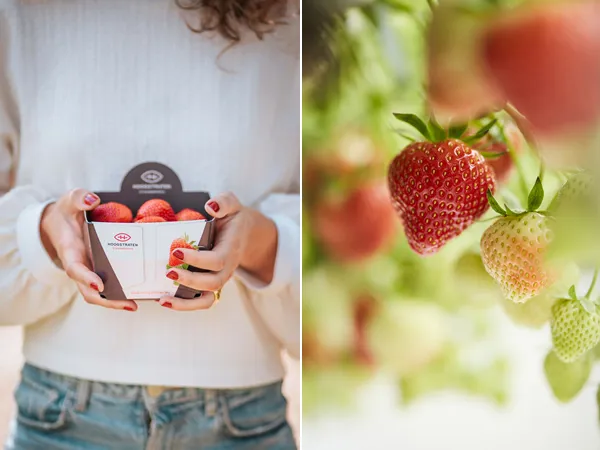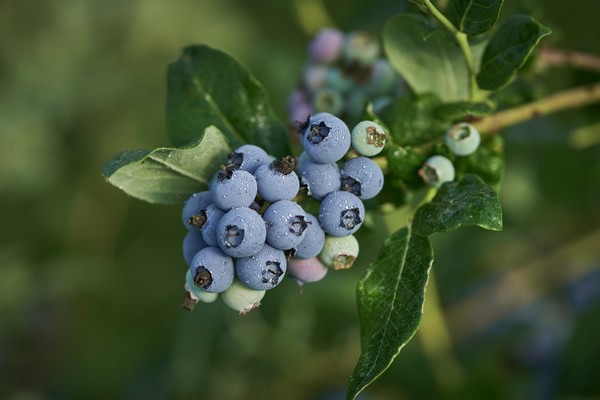Although the weather is not yet showing, we're already heading towards the last weeks of summer. This obviously does not mean the end of strawberry production, but there is currently a wait for the larger supply again after the summer, explains Michiel Vermeiren of Belgium Coöperatie Hoogstraten. "A combination of switching to everbearers and later planting due to the weather means we are currently looking at lower volumes, but from the second half of September volumes will slowly increase again."

It's been a challenging summer for the cooperative and its growers, but one that was again completely different from last year. "That's always the case with fruit, of course," says Michiel. "We depend on the weather and we have seen a lot of fluctuations. In the spring, it was wet and dark, then the weather calmed down. The heat that then came around the corner in July created a certain supply peak at the end of July and early August. Then we saw as much as three times more volume in some weeks compared to last year. Back then, of course, we were in deficit due to the heat waves in June, but now it was completely the other way round. That also had its impact on prices during some weeks."
"However, for most products in our fruit range, it has been a pretty good summer," he continues. "It always remains to be seen how things will turn out in terms of productions, but all in all everyone has been quite busy. This was certainly the case with our strawberry growers, because the heat meant that the harvest peaks coincided with the cuttings, which had to be well managed. Specifically in outdoor crops, we saw fewer kilos due to a combination of the shrinkage in acreage and the weather."
No boost Olympics
On the other hand, Michiel argues, the demand has been there. "You see that inland consumption always drops somewhat in the summer. In addition, we notice that from mid-July it's holidays all over Europe, but as long as temperatures are good, the demand for strawberries will always be there. However, we didn't really see the effect of the Olympics that everyone was talking about. France was logistically difficult to reach, especially in Paris. Moreover, many people had fled the city, so there was certainly no boost."
 © Coöperatie Hoogstraten
© Coöperatie Hoogstraten
"Besides, by then the other fruits were coming into full production, so strawberries had to step down on the shop shelves compared to stone fruit and the like. We did see some things coming together, leading to a somewhat stagnant situation by the end of July/beginning of August, while volumes were shooting up. This was the case with us, but we also saw it in surrounding production areas, causing pricing to fall back. Fortunately, we are now back to a nice price level."
Between two waves of production
So currently there is a lot lower supply, so the wait is for the second half of September to arrive. "With the heat we have had, the production of summer crops has also accelerated. As a result, we're currently waiting for the last volumes of rack crops and the start-up of autumn crops, which were also generally planted up a bit later, because it was too hot. In addition, many of our growers have also partly switched to everbearing varieties. There, we see that most are now in between two production waves and it also remains to be seen how much production will come from these when the weather turns colder and the days become shorter. The combination of the two is causing us to be stuck with lower supply at the moment, and therefore higher prices."
Incidentally, Michiel has no fear of gaps in supply in the autumn, like last year. "Partly because we saw how it went last year, the planting happened a bit later, so we don't expect the peak production of our autumn glasshouse area until mid-October. If nothing crazy happens with the weather, and it doesn't look like that will, we will get sufficient volumes until the end of the year. At least more than last year, anyway."
Blueberries/raspberries/blackberries
Besides strawberries, which is the largest product group of Coöperatie Hoogstraten, other soft fruits are also in demand during the summer months. "The blueberry season is almost over. We will continue for another week or two and then it will be done. All in all, it has been fine season. We have received about 80 tonnes of product. Normally this volume is a bit higher, but because of the wet and dark spring, the setting and ripening was different."

"We try to differentiate ourselves from the import story by focusing on sustainability and quality, especially in the local and domestic market. We are in the market mainly with the Netherlands, Germany and Eastern Europe at the same time in terms of production, but we have several partners in domestic retail who want to support local product and because we don't have that much volume, we can put that away nicely. The time is approaching when the first volumes will come from Peru, but we do notice a shortage of blueberries, so I think we can finish the season nicely."
"Raspberries and blackberries have also always been in good demand this summer," he continues. "The outdoor crops we have in there have been able to deliver a nice production. We noticed some gaps in supply in other places due to the heat, but because our productions peaked slightly differently, we were able to jump into the gaps nicely resulting in good prices," Michiel concludes.
For more information:
Michiel Vermeiren
Coöperatie Hoogstraten
Loenhoutseweg 59
2320 Hoogstraten, Belgium
Tel: +32 33 40 02 11
info@hoogstraten.eu
www.hoogstraten.eu
